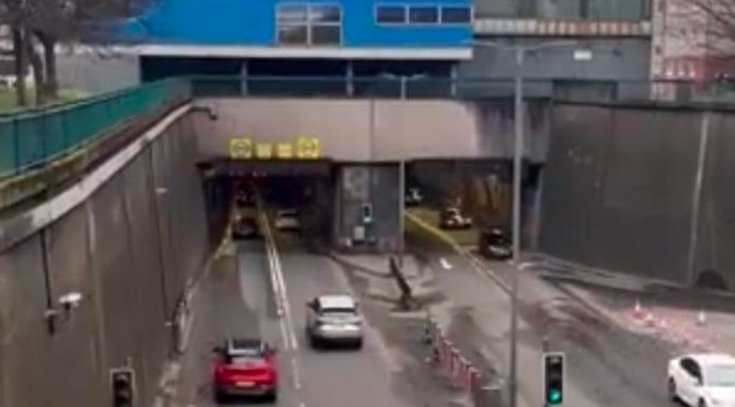With over 60,000 daily drivers at risk of being stranded, a brewing pay dispute could bring one of Scotland’s busiest arteries to a halt — and signal wider unrest across the country’s public sector.
The lifeline linking north and south Glasgow may soon grind to a standstill.
That’s the warning from GMB Scotland, the union representing key control room staff at the Clyde Tunnel, who say strike action is now all but inevitable after rejecting a below-inflation pay offer from Glasgow City Council.
The potential shutdown of the tunnel — used daily by tens of thousands of cars, trucks, and vans — threatens economic disruption across Scotland’s largest city, with ripple effects beyond.
The Nerve Centre of Glasgow
Bored beneath the River Clyde and opened in 1963, the Clyde Tunnel is a feat of civil engineering — but also a fragile bottleneck in Glasgow’s transport system. Its operation depends on a specialised crew based in Whiteinch, who work around the clock to monitor ventilation, surveillance cameras, and emergency response systems.
Without them, the tunnel cannot legally or safely operate.
“The workers at the Clyde Tunnel ensure thousands of motorists travel safely and without delay every day,” said Keir Greenaway, senior organiser at GMB Scotland. “Without their expertise, one of Scotland’s most important roads could close with untold disruption.”

Strike Warning Becomes Real
GMB Scotland announced Monday that it will formally ballot tunnel workers for industrial action this week. The decision follows an overwhelming consultative vote, in which 96% of council-employed members signalled support for walkouts if no improved pay deal is offered.
At the centre of the dispute is a 3% pay rise offer by COSLA, the umbrella group representing Scotland’s local authorities. GMB has branded the offer “insulting,” especially amid ongoing inflation and rising living costs.
The union is now escalating its pay campaign, demanding either a £1 per hour increase or a 6.5% rise across the board — whichever is higher.
Glasgow on the Brink
The stakes for Glasgow are high. The Clyde Tunnel is not a luxury — it’s a necessity.
It links Whiteinch on the north bank of the Clyde with Govan on the south, and is used by 65,000 vehicles every day, according to transport data. Disruption to this corridor would affect:
-
Commuters: Delays and rerouting through already congested bridges and motorways.
-
Logistics and freight: Deliveries across the city and west coast could face hours-long delays.
-
Emergency services: Critical response times may increase if detours are required.
While temporary diversions exist, none are designed to absorb the full weight of the Clyde Tunnel’s daily traffic.
Wider Industrial Strategy Unfolding
GMB’s action at the tunnel is not a one-off — it’s the first salvo in what the union calls a “strategic campaign” across Scotland’s councils.
Other sectors could follow suit. Waste workers, school support staff, and social care teams are all part of GMB’s membership — and many are similarly dissatisfied with COSLA’s offer.
“This is just the beginning,” Greenaway warned. “The Clyde Tunnel team is the first. But more ballots are coming unless councils return with an offer that respects the work our members do.”
Political Pressure Mounts
The political response, so far, has been restrained.
A spokeswoman for Glasgow City Council said the authority would “await the outcome of the ballot” and continue engaging with the union. But behind closed doors, officials are reportedly concerned that a tunnel shutdown would leave them politically vulnerable — especially if mirrored by industrial action in schools or waste services.
The situation is also politically awkward for the SNP-led Scottish Government, which doesn’t directly control local authority pay but is under mounting pressure to fund councils adequately. With public sector strikes already mounting in England and Wales, ministers in Edinburgh are keen to avoid the same contagion north of the border.
A Crisis of Recognition
At its heart, the dispute is not just about money — but respect.
“The offer is nowhere close to matching the commitment of council workers,” said Greenaway. “It adds pennies to the hourly rate of the lowest-paid — it’s effectively a pay cut in real terms.”
He added: “Council workers were on the frontline during Covid. They’ve held communities together through budget cuts and staff shortages. And now they’re being told that’s worth less than inflation. It’s no wonder our members are angry.”
What Comes Next?
If the ballot passes, strike action at the Clyde Tunnel could begin within weeks — with Glasgow City Council facing massive logistical and reputational fallout.
Meanwhile, GMB is reportedly preparing ballots for waste and recycling services in Edinburgh, as well as school support staff in Fife and Renfrewshire.
This may be just the beginning of a summer of public sector discontent in Scotland.
But for now, all eyes are on the Clyde — and the tunnel that keeps a city moving.


















